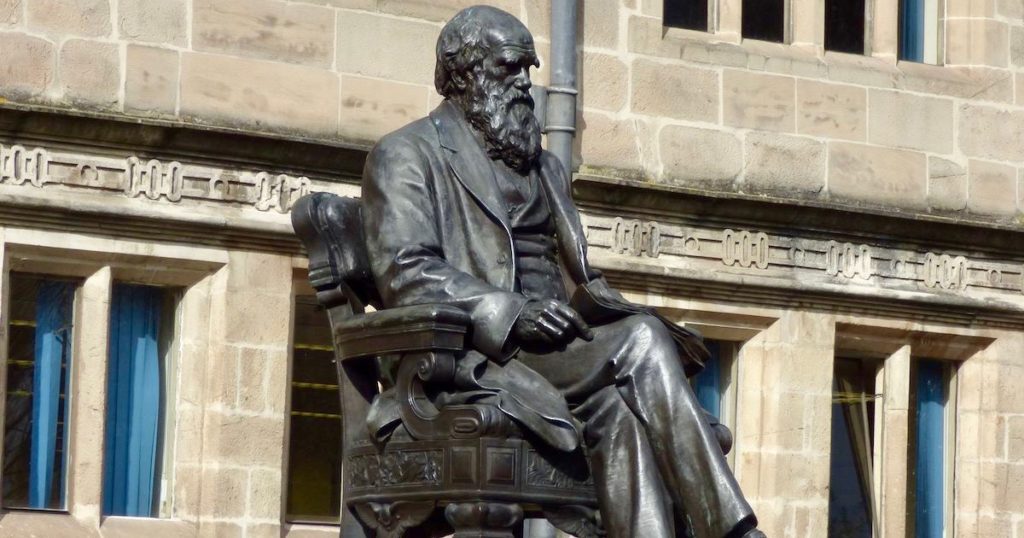 Evolution
Evolution
 Paleontology
Paleontology
Fables of Evolutionary Psychology (aka Sociobiology)

Editor’s note: We are delighted to host a new series by Neil Thomas, Reader Emeritus at the University of Durham, “How I Came to Take Leave of Darwin,” of which this article is the fourth installment. Find the full series here. Professor Thomas’s recent book, Taking Leave of Darwin: A Longtime Agnostic Discovers the Case for Design, is available now from Discovery Institute Press.
Not the least of the negative effects exerted by Darwin on his intellectual legatees, the sociobiologists (now tactically rebranding themselves “evolutionary psychologists”), is the tendency to play fast and loose with empirical evidence. In the absence of any testable (“falsifiable”) evidence of their own to substantiate their speculations, evolutionary psychologists are prone to make up just-so stories which are then (they hope) passed off as being entirely veridical. Hence it can sometimes appear that Darwin’s long shadow has had the effect of furnishing a form of carte blanche licensing all manner of pseudo-scientific credulities. As a life-long rationalist, I find this tendency disturbing. One example from the more recent crop of sociobiologists is Steve Stewart-Williams who, in his portentously titled Darwin, God and the Meaning of Life, skates just as blithely over the insuperable biological problem of the species barrier as did Darwin himself. Despite numberless objections that micromutation cannot ever advance to the stage of macromutation, he restates the old Darwinian position on the subject as if it were incontrovertible fact:
Over incomprehensibly vast stretches of time, the slow accumulation of serendipitously advantageous traits really adds up. It can result in the formation of complex adaptations (such as eyes and wings and the elephant’s trunk and the human brain).1
Compounding the Error
He then proceeds to compound the error by attempting to face down any possible objections with defiance and even, like Darwin before him, makes the false claim that the fossil record supports his position when in fact it does the very opposite (it was after all the embarrassing dearth of fossil evidence that drove Gould and Eldredge to posit their alternative theory of punctuated equilibrium in 1972):
If natural selection can produce small-scale change in the short term, why could it not produce large-scale change in the long term? Unless a compelling example can be found, a sensible default assumption would be that it could and does. And let’s not forget all the indirect evidence (the fossil record, etc.) suggests that species do indeed evolve from other species.2
Both the “default assumption” to which Stewart-Williams refers and the corroborative fossil evidence are simply without basis in empirically observable fact. Certain entrenched fallacies, it appears, however much contra-indicated by empirical evidence, have a habit of becoming cryogenically frozen and at a later date revived from their unnatural life-support system. Defying all attempts to quash them by any rational form of Whack-a-Mole, they are tactically un-frozen when it is deemed they may be “worth one last chance” of supporting the strictly materialist interpretation of life.
In the Beginning
Despite the ambiguous title of his famous treatise, the question of life’s origins remained bracketed off from Darwin’s published work (which is concerned with what might be termed the “origination” of species (speciation) rather than their absolute origin). On the other hand, Darwin is on record in a famous letter as speculating that all life could have begun by spontaneous generation from a reaction of chemical elements within a “warm, small pond” — the postulate underpinning modern ideas of “abiogenesis” with its notions of chemical “self-assembly” in a watery medium or “prebiotic soup.” Prudently, however, Darwin did not wish to set too much store by his own conjecture and warned that the origin issue must remain “ultra vires [beyond our powers] in the present state of our knowledge.” (In later life he would write, in a letter of 1876, that “the mystery of the beginning of all things is insoluble by us.”)
It is perhaps a pity that Darwin did not carry over the same scholarly reserve to his ideas on evolution as well. Ignorance has become a loaded term in modern English — “nescience” was the more neutral, non-value-laden Early Modern word which did not contain the same stigma as its modern equivalent; for truly to announce that one does not know should not be a cause of shame. There are after all myriad awkward questions that bright children ask and adults can’t answer. In the present context for example it might fairly be asked: What is the ultimate origin of the genetic code and who or what directed it to produce plant and animal species? Such questions simply cannot be answered since, as Paul Davies commented, “ultimate questions will always be beyond the scope of empirical science as it is usually defined.” It surely does no harm to admit such things. It might have been truer to Darwin’s later private anguish about the viability of his theory if he had applied the expression he used about the origin of life to its sequel (evolution) and simply stated that the whole question of human creation/evolution was a work in progress and, as to definitive conclusions, these must remain, to repeat his Latin tag, “ultra vires in the present state of knowledge.”
The “Mystery of Mysteries”
Although later scientific generations were drawn to test Darwin’s tentative guess about life emerging from a watery medium, it appears that the author’s original diffidence was well-founded. The oft-cited experiment carried out by Stanley Miller and Harold Urey in 1953 to assess the feasibility of producing life in a test tube did not, in the event, discover the complete chemical pathway the experimenters sought to identify (despite early, overoptimistic reports in the media from the early to mid 1950s). In fact, the failure of the experiment to create life gave what can only be described as a resounding victory to the theistic position, in that the “triple lock” imposed by Sir William Harvey, Francesco Redi, and Louis Pasteur (all three scientists had long since proved the impossibility of creating life from non-life) proved itself “unpickable”: life was not to be procured from non-life. In fact, the unsatisfactory result of the experiment delivered nothing less than a presumptive indication of a supra-natural origin of the cellular system.
The large claim that life could arise from a reaction within any chemical substrate possessing the requisite prebiotic properties has, in addition, failed to be confirmed by recent space exploration. Had the 20th-century Viking space mission been successful in finding evidence of even rudimentary life on the Martian surface, it might have been taken as confirmation by analogy that terrestrial life had emerged from a comparable chemical matrix. However, the space searches found no incontrovertible evidence and there is less confidence now than there was in the 1980s that some autonomous “cosmic imperative” might prompt the production of life wherever the “right” geochemical conditions prevailed. Hence the essential question of how chemistry could be transmuted into biology remains unresolved. The “mystery of mysteries,” as the Victorians termed it, remains.
Next, “The Stars Above Us.”
Notes
- Darwin, God and the Meaning of Life (Cambridge: CUP, 2010), p.29. It need hardly be pointed out that the convoluted phrase ‘serendiptitously advantageous’ merely means ‘lucky’.
- Darwin God and the Meaning of Life, p. 34.
